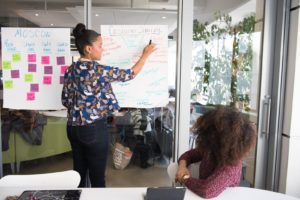 Image retrieved from Pexels.
Image retrieved from Pexels.
Given the current landscape — “open” vs. “closed” states; differing viewpoints on mask mandates and vaccine adoption; the ability of the U.S. to achieve herd immunity; travel restrictions; reduced professional development budgets; personal comfort with travel and face-to-face events; and so many other factors unique to our industries and organizations — it’s no wonder we’re having a difficult time deciding what events to hold, postpone, cancel, reimagine, sunset, or transition to a new format (like virtual or hybrid).
Pre-pandemic it was easy to fall victim to the copy-and-paste event. If it wasn’t broke, why fix it? But so much has changed in the last year. So if we’re not first convening a representative stakeholder group of staff, volunteer leaders, and members, then asking the right strategic questions, we’re designing an event based upon old expectations that may no longer serve the needs of our target audience. And most of us can’t afford to funnel limited staff resources into an event that’s poorly attended and falls short of budget projections.
Taking a more proactive approach, following are the nine sets of key questions I ask when working with clients as part of my event analysis before ever jumping into planning mode. In my experience, the answers to these questions evolve and become more well-rounded the more I intentionally elicit perspectives and encourage discussion.
Who?
- Pre-pandemic, who was the target audience for this event?
- What attendee segments did you use to further distinguish the knowledge, skills, abilities, and experience of your audience?
- For this year’s event, are there any intentional adjustments to the target audience (e.g., either extending into new audiences or focusing on fewer, more niche audiences)?
What?
- Pre-pandemic, what was the typical agenda for this program?
- For this year’s event, what elements are a must have?
- What elements can you let go?
When?
- Pre-pandemic, what is the typical date and time for this program?
- For this year’s event, what is the anticipated date, maximum duration, and approximate timing?
- Will the date and time differ at all for the in-person vs. remote audiences, if applicable?
Where?
- Pre-pandemic, where would this event typically be held?
- What in conjunction with (ICW) activities would you typically host with this program?
- Where would these ICW activities typically be held?
- For this year’s event, will you hold an in-person, virtual, or hybrid program?
- Where do you anticipate the in-person component will be held, if applicable?
- What virtual platform/production partner do you anticipate using, if applicable?
- What ICW activities do you intend to host?
- Where do you intend to host them?
Why?
- Pre-pandemic, what was the attendee, sponsor, and/or exhibitor value proposition for hosting this program?
- Did this program have longevity (e.g., recorded content) following the live event?
- What was your organization’s primary purpose for hosting this event (e.g., bylaw requirement, revenue, knowledge sharing, networking)?
- For this year’s event, what’s the new attendee, sponsor, and/or exhibitor value proposition?
- Does this program need longevity (e.g., recorded content) following the live event?
- What’s your organization’s primary purpose for hosting this program?
How?
- Pre-pandemic, who were the key internal players planning this event?
- What were their roles in bringing this program to life?
- Who were the key external stakeholders (e.g., sponsors/exhibitors, production company) who supported this program and what roles did they play?
- For this year’s event, have any of the internal key players and their roles changed?
- Have any of the external stakeholders and their roles changed?
Goals?
- Pre-pandemic, what were the following goals for this event:
- Numbers (e.g., registration, attendance, membership conversion, sponsors, exhibitors, other)
- Dollars (e.g., attendee, sponsor and exhibitor revenue; expenses; pricing strategy/categories)
- Goals (e.g., learning, networking, other)
- For this year’s event, how have goals changed in each category?
- How will your pricing strategy/categories change?
Milestones?
- Pre-pandemic, what were your traditional milestone dates?
- Agenda finalized?
- Marketing materials?
- Registration open?
- Speakers secured?
- For this year’s event, what are your new milestone dates?
Miscellaneous?
- Pre-pandemic, what other things did we just “know” about this program?
- For this year’s event, what do we know about the tolerance of prospective attendees relative to virtual/hybrid events?
- What about their comfort level with technology?
- What is top-of-mind for prospective attendees right now (e.g., specific education, networking opportunities)?
- What have we learned from other events over the last year (both internal and external to our organization)?
- Examine evaluation data, attendee behaviors and the like. What trends/aggregate key findings are illuminated?
- For this year’s event, what else represents a “given” or a “previously made decision” it would be helpful to record and plan for?
In completing this event analysis, we’re looking for similarities, along with substantive differences, between our pre-pandemic and current-year responses. If we’re trying to copy-and-paste a pre-pandemic approach, hanging on to too much from the past, or adjusting facts and figures in a vacuum, we might be building this year’s event on a house of cards that could literally collapse at any time. In lieu of years of event history, use the honest answers from this assessment to establish a strong foundation upon which to build your recalibrated event.
Leave a Reply